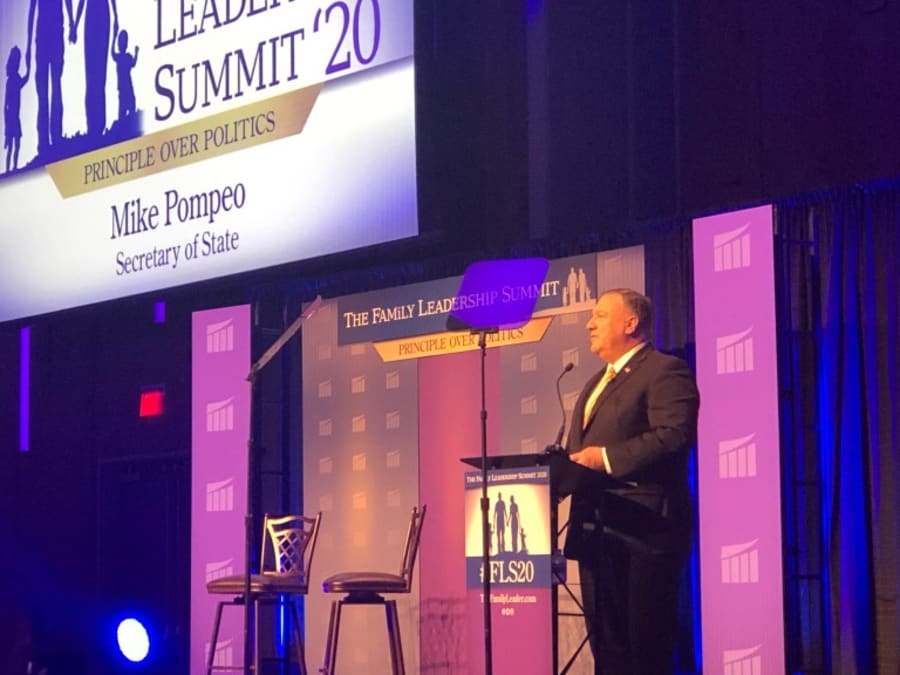Pompeo in Iowa makes case to Evangelical conference that Trump team is the most pro-Israel administration in US history
US Secretary of State makes no mention of annexation. Is annexation off US agenda for now?

DES MOINES, Iowa — When Secretary of State Mike Pompeo came here to the American heartland on Friday, Israel was one of his major topics.
Less than four months out from the high-stakes November presidential elections, Pompeo made the case to “The Family Leadership Summit” — a conference of some 1,000 Evangelical leaders and grassroots activists — that the Trump team has been the most pro-Israel administration in American history.
Yet not once did he bring up the hottest topic in US-Israeli relations this summer: Is President Trump preparing to give Prime Minister Netanyahu the green light to “annex” — or, more precisely, peacefully incorporate — large swaths of Judea and Samaria (a.k.a., the West Bank) into the sovereign state of Israel this summer or Fall?
 Photo by All Israel News Staff
Photo by All Israel News StaffIt was a conscious, strategic, striking omission, raising the question as to whether annexation is no longer on the administration’s radar screen — at least until after they know whether they have won another four years in office.
For the last two months, talk of possible annexation has dominated headlines in Israel, the Palestinian Authority and Arab states throughout the region. At one point, it almost seemed a done deal. Netanyahu was vowing to move forward decisively beginning July 1st. Many analysts believed President Trump would support the move to please his Evangelical political base.
But there was no sign of that Friday.
Pompeo did not raise annexation in his prepared remarks to the 700 Evangelical activists in the room and the 300 more Evangelicals watching the Summit online from nearly all 50 states — the largest Christian conference in months.
Nor did Pompeo raise annexation Friday evening during a VIP dinner that he, his wife Susan and their son and his girlfriend attended with some 200 Evangelical business leaders and donors.
The host of the Summit and dinner — Bob Vander Plaats, head the pro-family, pro-Israel organization known as “The Family Leader” — interviewed Pompeo for about 45 minutes before the meal, but he didn’t ask about annexation issue either.
This was a noteworthy signal that with so many issues on the plate of American Evangelicals, from COVID-19 to massive unemployment to closed churches to race relations and riots, Israeli annexation simply isn’t on the agenda.
“I’m proud that there has not been any administration who has supported Israel in the way that President Trump and our administration has done,” Pompeo told the Summit to tremendous applause. “We moved our Embassy to Jerusalem. We said that the Golan Heights is a part of Israel. We now have released a Vision For Peace that recognizes reality on the ground, the Biblical truth in that special place. And we said that anti-Zionism is indeed anti-Semitism.”
 Pompeo noted that when it comes to our “closest friend in the Middle East, Israel,” that “here too my [Evangelical] faith shapes my work. Our nations share Judeo-Christian roots. Our approach to government draws on that beautiful teaching from the first chapter of Genesis: that all human beings are made in the image of God. It’s a major reason why both countries have a high respect for human dignity and personal liberty. Each of our two nations respects human rights and it only makes sense for the two countries to be so close, as close as we possibly can be. And from a pure foreign policy standpoint, Israel is an essential security partner.”
Pompeo noted that when it comes to our “closest friend in the Middle East, Israel,” that “here too my [Evangelical] faith shapes my work. Our nations share Judeo-Christian roots. Our approach to government draws on that beautiful teaching from the first chapter of Genesis: that all human beings are made in the image of God. It’s a major reason why both countries have a high respect for human dignity and personal liberty. Each of our two nations respects human rights and it only makes sense for the two countries to be so close, as close as we possibly can be. And from a pure foreign policy standpoint, Israel is an essential security partner.”
Israel, the Secretary said, is “a model in the Middle East of how to create a thriving economy. And Israel too is a bastion of freedom in the region.“
The one time that annexation came up during the day was when Miami-based Jewish businessman Simon Falic, the sponsor of the dinner and a close financial and political supporter of Netanyahu, made a few remarks before the meal and offered a Hebrew blessing. Falic spoke quite movingly about the importance of the US-Israeli alliance, the prophetic rebirth of Israel in 1948 and the ingathering of Jews back to Israel after centuries of exile.
Falic encouraged Pompeo and the administration to help Israel make more of the Biblical heartland of Judea and Samaria part of the current state. He also urged Pompeo to be wary of creating any Palestinian state that could threaten Israel.
Pompeo also spoke about the threats posed by China, Russia and Iran; the administration’s efforts to advance human rights — including religious freedom — around the world; and his efforts to improve trade policy to help American farmers, workers and businesses.
Iowa Senator Joni Ernst addressed the Summit, as did Iowa Governor Kim Reynolds, former Senator Rick Santorum, “My Pillow” businessman Mike Lindell, myself and several others conservative leaders. (I’ll share more about my remarks in a separate story.)

Pompeo was particularly effective during the dinner-time interview — very warm, engaging, funny, shared great insider stories, talked about his personal faith in Jesus Christ and how he and his wife used to teach a Sunday School class of 5th graders back at their church in Kansas until the intensity of their Washington schedules made that no longer possible.
There was no small degree of speculation among attendees that I spoke with that Pompeo came to Iowa during the COVID crisis because he is laying the groundwork for a future presidential run. True or not, he and his wife, Susan — who is originally from Iowa and introduced her husband at the Summit — certainly made a very positive impression, received multiple standing ovations and left the state with a growing reserve of goodwill.

Joel C. Rosenberg is the editor-in-chief of ALL ISRAEL NEWS and ALL ARAB NEWS and the President and CEO of Near East Media. A New York Times best-selling author, Middle East analyst, and Evangelical leader, he lives in Jerusalem with his wife and sons.














